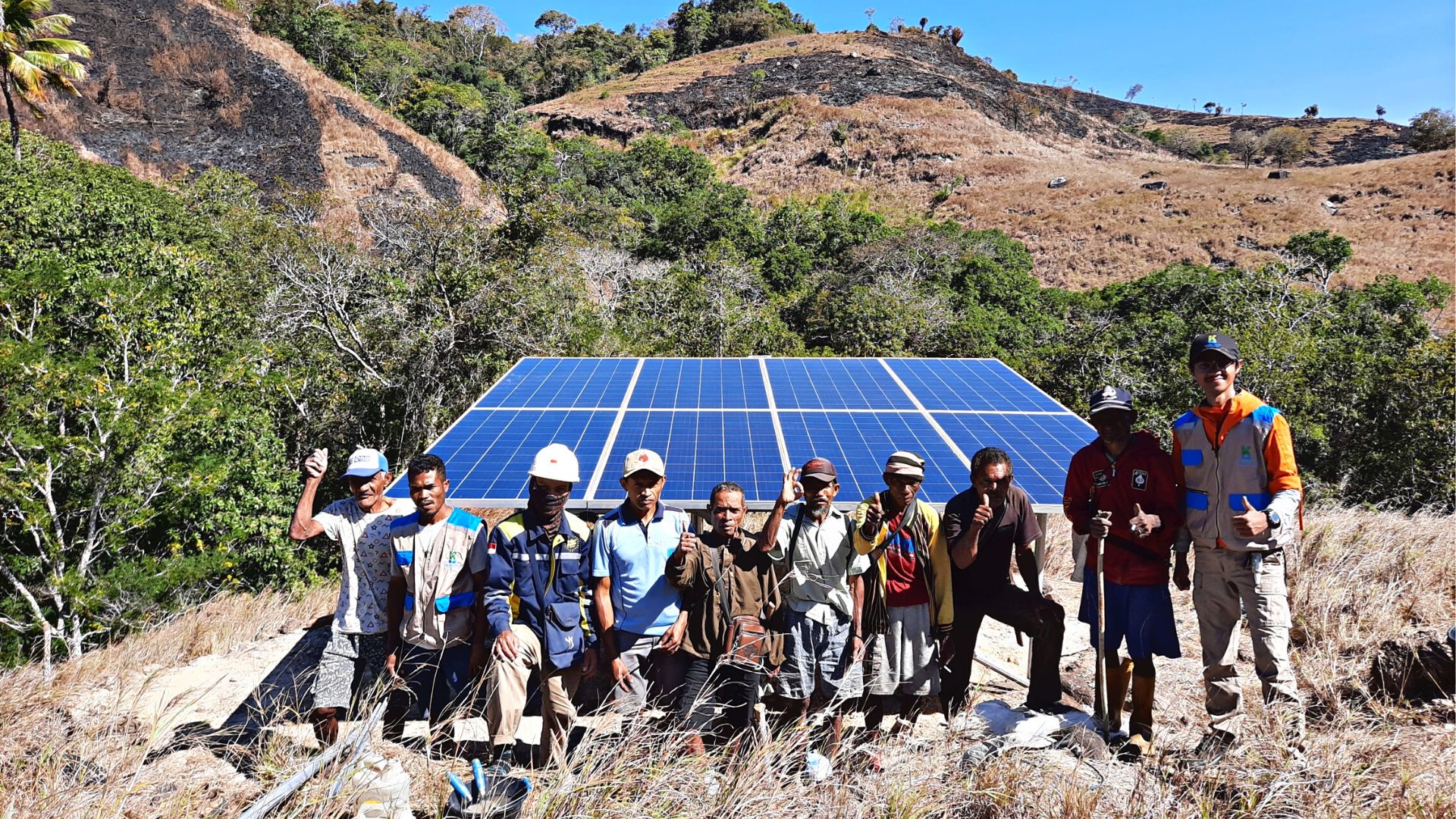by Heleena De Oliveira, Innovations Intern, UNDP
Komodo Water brings clean water to thousands of people living in Indonesia’s most remote areas
Success story from Kawa Traditional Village, Nagekeo Regency, East Nusa Tenggara region, Indonesia
Born in the remote Indonesian village Kawa Traditional, with a population of around 1000 people, Marselina is the daughter of the local village elder. At the age of 34, her village is all she has ever known.
She is deeply connected with the lush, natural forestland, which stretches out as far as the human eye can see, and the towering mountains, which loom over the bamboo homes where her friends and family live and sleep.
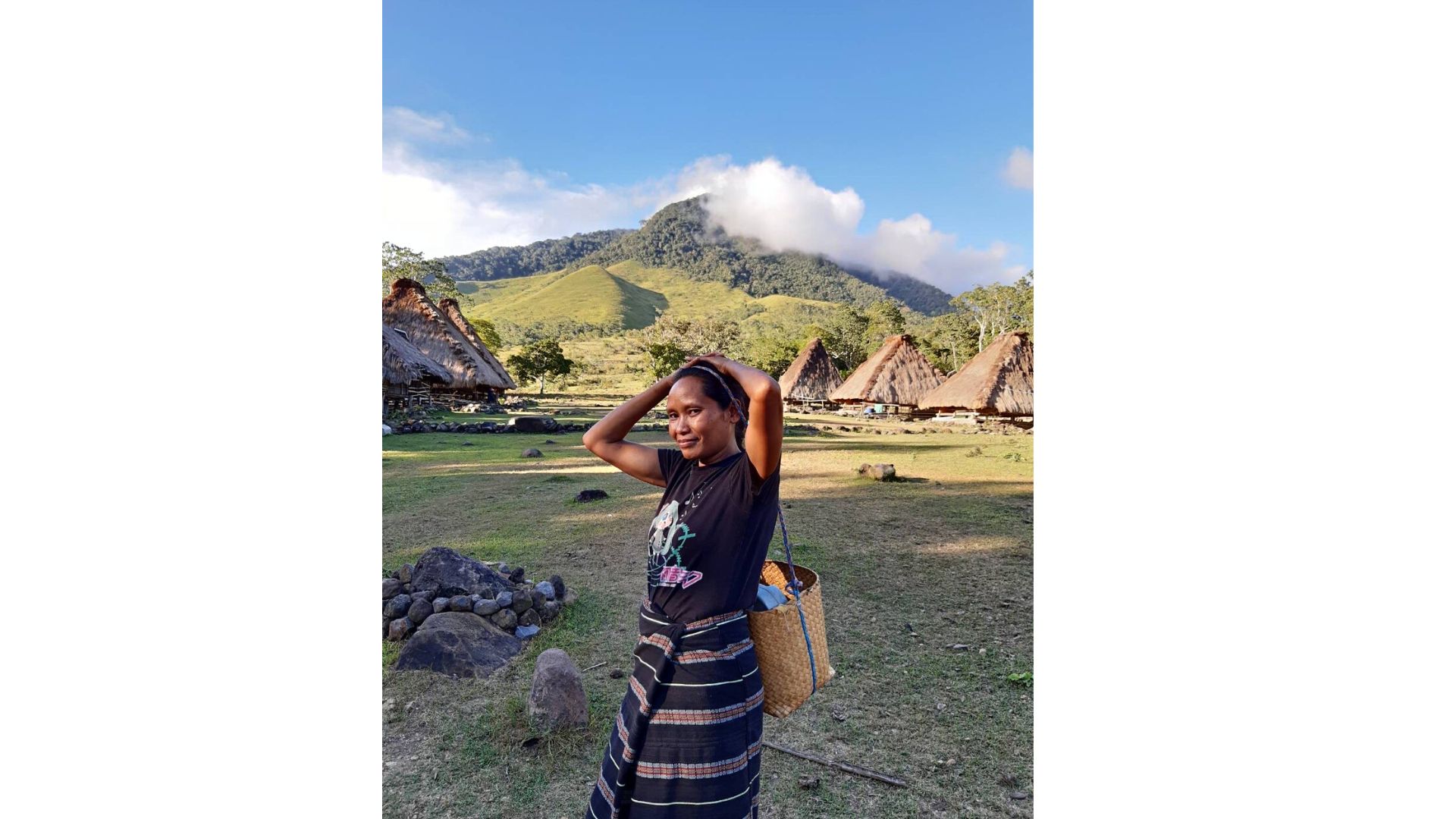
Marselina in Kawa Traditional Village, where she grew up. Behind her are bamboo huts and the natural beauty of the Nagekeo Regency on full display
Like the other women in her village, Marselina plays several important roles which help her community thrive. These roles are largely domestic, and include cooking, cleaning, and fetching water.
The nearest source of clean water is from a river, 2 km away from Marselina’s home. Each day she must travel there and back on foot through the rocky and steep terrain. Despite the beauty of the Nagekeo Regency, there is little access to clean, drinkable water.
Warmer days on the island are particularly unbearable, the sun is unforgiving, beating down relentlessly on Marselina’s back as she bends down, balancing her weight on the smooth, slippery stones beneath her feet as she fills her jerry cans with water. As she lugs the now heavy containers, teeming with spring water, the 2 km walk back up the hill to her village feels endless. When she arrives home, all this water will be used for her daily cooking and washing.
The next day, she will have to repeat this process all over again.
Marselina is one of thousands of people across Indonesia who struggle to access clean and drinkable water on a daily basis.
The Birth of Komodo Water
In 2011 an Indonesian woman named Shana Fatina, a serial entrepreneur with a background in industrial engineering, focusing on renewables, sustainability, and the environment, visited the Komodo National Park in Indonesia. Fatina is an avid traveler with a zeal for diving. Uncoincidentally, Komodo National Park is beloved by scuba divers globally, and is considered amongst the best diving sites in the world. During her trip she paid a visit to the locals in Papagran, a village located on a remote island named Papagarang, near the national park.
In Papagarang, water is everywhere, but none of it is safe to drink.
Papagran is home to a solemn and humble fisherman’s community. Upon Fatina’s arrival to the village, she was shocked to witness the lengths at which locals, like so many other Indonesians, were forced to go to acquire drinkable water. It could only be purchased from the mainland, Labuan Bajo, or from water sellers who traveled to the island by boat. Collecting the water from the mainland is an extremely costly process – not only do locals need to purchase the water but they are obliged to pay for the transportation as well.
Angered by the situation, Fatina was compelled to stay on the island for a year, study the problem, and figure out a solution. Thus, the organization Komodo Water was born – out of concern for the villagers of Papagran, with the aim to provide them with clean water services. Now operating for over 10 years, Komodo Water’s mission has evolved to provide integrated and sustainable water management solutions to remote-coastal areas in Indonesia.
Navigating life without its most critical resource
Access to safe drinking water and sanitation are universally considered human rights, and yet, according to UNICEF nearly 25 million people in Indonesia are deprived of this very basic need. [1]
Drinking contaminated water can cause a plethora of illnesses, including diarrhea, dysentery, and cholera, as well as growth disorders that cause stunting in children. In fact, one of the leading causes of mortality in the country is diarrhea – about a quarter of all children under the age of five in Indonesia suffer from this sickness. A 2017 study revealed shocking results – approximately 89% of water sources and 67% of household drinking water in the country were contaminated by fecal bacteria. [2]
Besides health issues, the lack of clean water in Indonesia also affects its economy, including manufacturing, farming, and energy production. In regions like Nusa Tenggara, home to an abundance of exotic flora, fauna, and stunning landscapes, the lack of clean water devastates the tourism industry.
We met with Nissa Nurrohmah Syayidah, a spokesperson and employee for Komodo Water, who explained: “The presence of water is vital for tourism.” Most hotels and restaurants need huge amounts of water to operate. Without water, they cannot offer basic services or facilities to their guests, such as cleaning, cooking, or working restrooms.
Even though tourist facilities and hotels typically have an unsustainable approach to their water consumption, tourism in countries such as Indonesia is a quintessential driver of economic growth, inclusive development, and when applied responsibly, can offer many opportunities for the advancement of the United Nations 17 Sustainable Development Goals (SDGs).[3]
It is clear then why the mission of Komodo Water and other similar organizations should be considered a priority for the country.
“We believe that this problem is not only happening […] in coastal [areas], but also in higher, more remote areas. Based on the government data in Nusa Tenggara […] 25% of the households in Nusa Tenggara [still do not have access] to proper and sustainable clean water services,” says Syayidah.
Creating innovative solutions
Komodo Water has taken an innovative approach to solving the issue of clean water scarcity in Indonesia. But to start this process they needed capital. That is why in 2021 Komodo Water joined the Tadamon Crowdfunding Academy and subsequently launched their first crowdfunding campaign on both Kitabisa and Launchgood’s platforms. They succeeded in raising nearly $12,000 USD, effectively doubling their initial $5,000 USD goal through the campaign alone. In total, they managed to collect around $68,000 USD through grants and in-kind contributions.
With this money, they were able to begin the work which will facilitate nearly 6,000 people’s access to clean water, using clean and sustainable energy, in four villages across the Nagekeo regency.
Syayidah explained what the process of generating clean water looks like: “We have to utilize the water that already exists on the island, which is brackish water. So, we process the brackish water into fresh water that meets the standard for drinking water.”
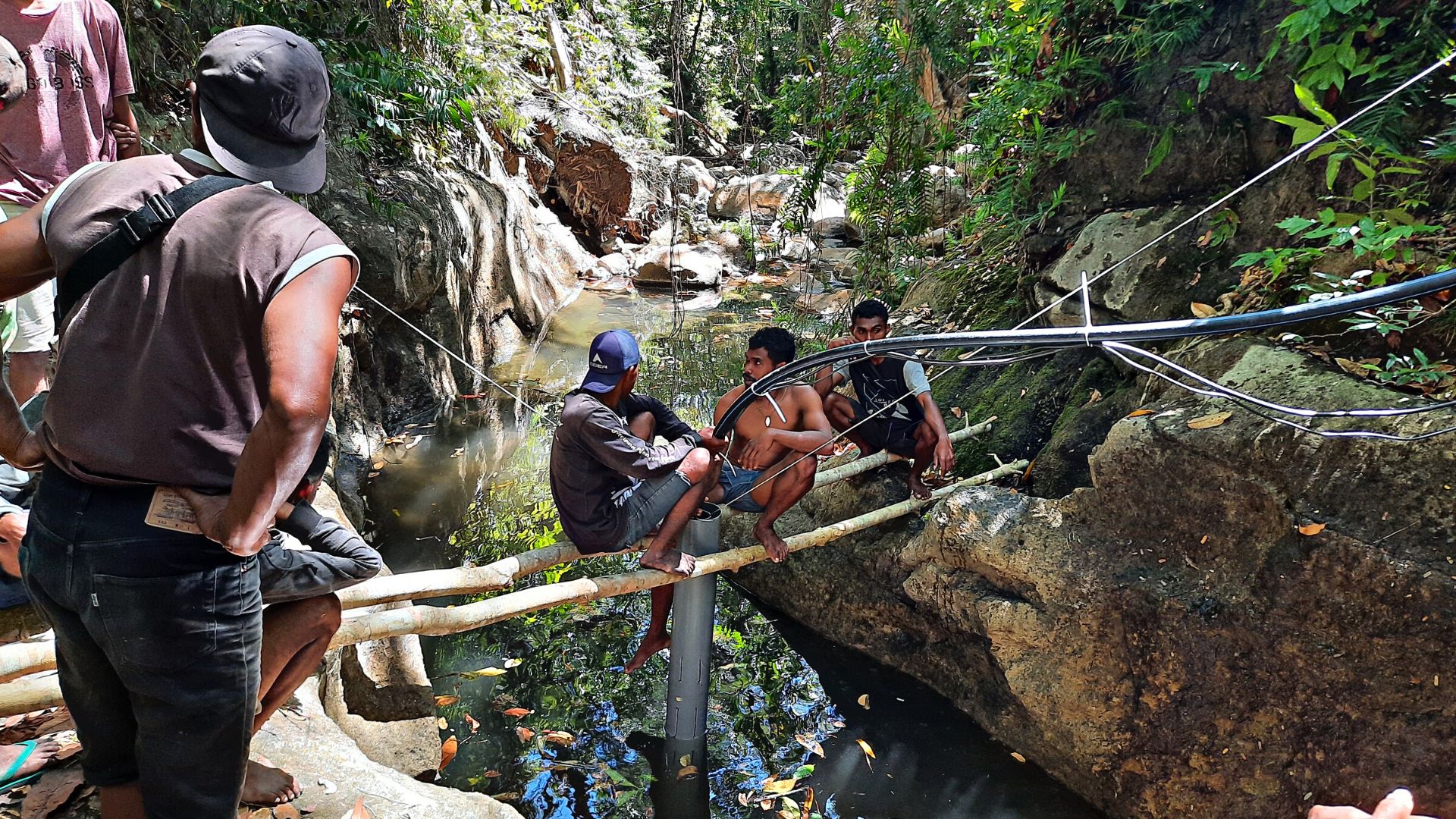
Members of Komodo Water, and the locals from Kawa Village install piping in the river near Kawa which will later be used to transport water to the village
Thus, in 2022 the campaign donations were used for water drilling, piping, and the construction of a water tank in the Kawa, Ngegedhawe, Wodomia, and Tutubadha villages. In order to ensure the sustainability and longevity of the project, a mentoring and monitoring program, which involves local participation, will also be set up in the coming months.
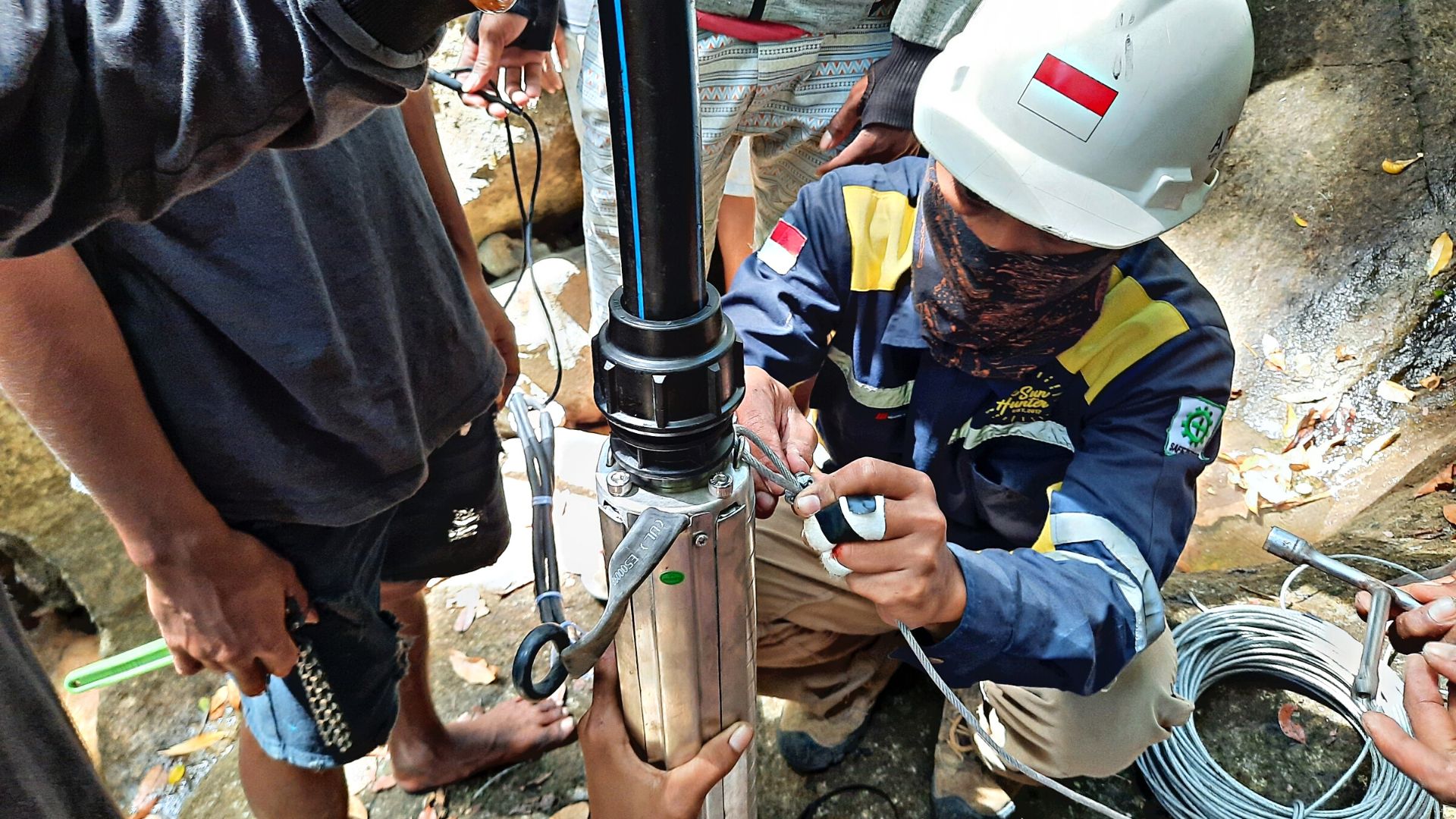
The team drilling for water
At present, Komodo Water has already completed the first phase of the project in Kawa, which is to drill and build pipelines from the river to the village. This was a fairly challenging task, given the river's location downhill to the village, as well as the sheer distance between them. However, the organization was able to overcome this through an ingenious strategy – the installation of two solar water pumps which would pump the spring water to a water tank located between the Kawa village and the river, which then connects to another water tank within the village itself.
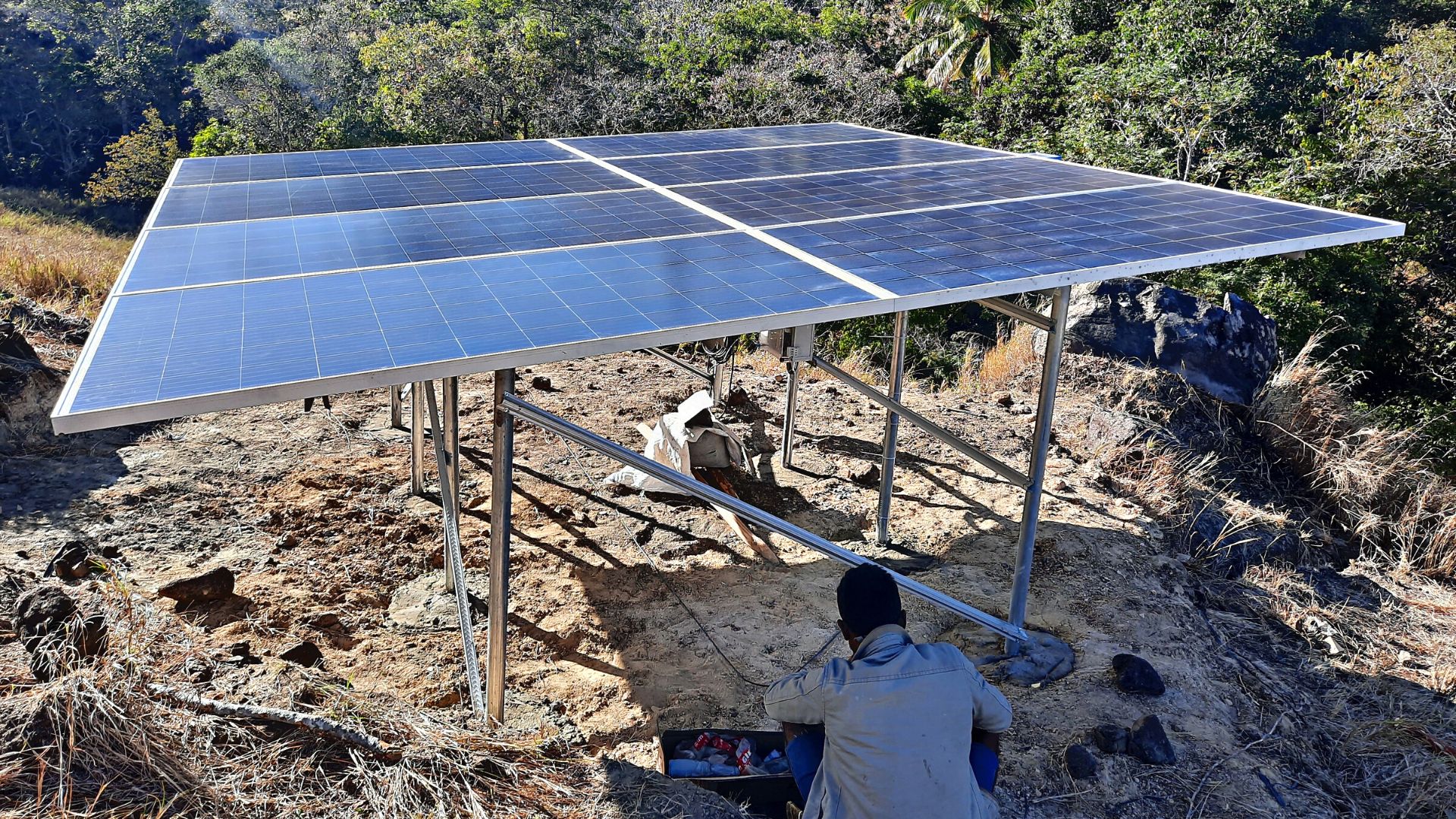
One of the two solar water pumps which will be used to pump water to a water tank located between the Kawa village and the river
Unlocking crowdfunding’s many benefits
Besides funds, the greatest advantage of crowdfunding was that it gave Komodo Water visibility, Syayidah revealed. This visibility manifested itself in a number of crucial ways, notably in the form of partnerships and grants.
Indeed, Komodo Water was awarded a grand total of $36,000 USD in grants from the New Zealand embassy and their local bank, Nusa Tenggara, through their CSR policy. These grants alone were enough to cover the entire cost of their initiative, which amounted to $30,000 USD.
The additional funds will allow Komodo Water to expand their work to other areas in Indonesia and carry out additional projects across the four villages.
It takes a village
Essentially, Komodo Water’s vision necessitated the participation of local actors. To their surprise, they found more than a handful who were enthusiastic to support a cause that would benefit their community at large. One small coffee shop called Bahagia Kopi in West Java, inspired by Komodo Water’s campaign, decided to make a contribution by donating a percentage of their profits.
Although Bahagia Kopi Café only managed to contribute one million rupiah, about 64 USD, to the campaign, their efforts resonated with Syayidah, “I remember it because it was a unique way to [contribute to the] campaign,” she says.
The majority of donors were Indonesians, living in big cities such as Jakarta, who only came to truly understand the gravity of the water crisis after being introduced to Komodo Water’s campaign. As such, the organization became a voice for thousands of Indonesians across the country who otherwise struggle to raise awareness about the issue.
At the end of the day, Komodo Water created a campaign with a mission that everyone could empathize with. Their efforts and their story moved people from around the globe, including individuals in Europe, the Middle East, and the United States, who were mobilized to contribute to their crowdfunding initiative. “I was amazed by how many people in other countries gave attention to our campaign,” says Syayidah.
The campaign has made it possible for Komodo Water to bring the elixir of life to more remote areas across Indonesia.
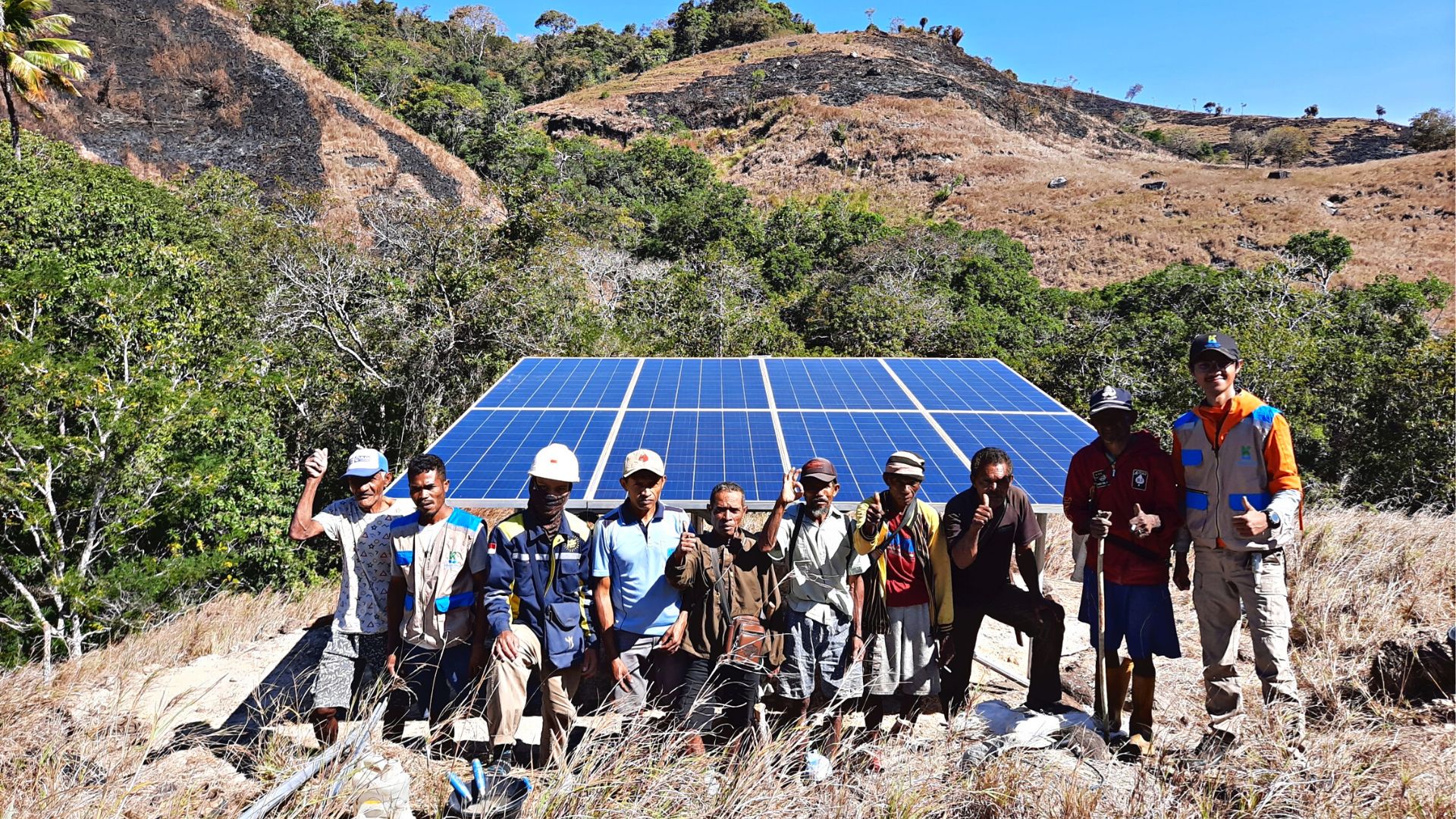
A gleeful and hopeful team gathers around the newly installed solar water pump
Credits:
Images captured and shared by Komodo Water.
Learn more about Komodo Water's work and support them.
